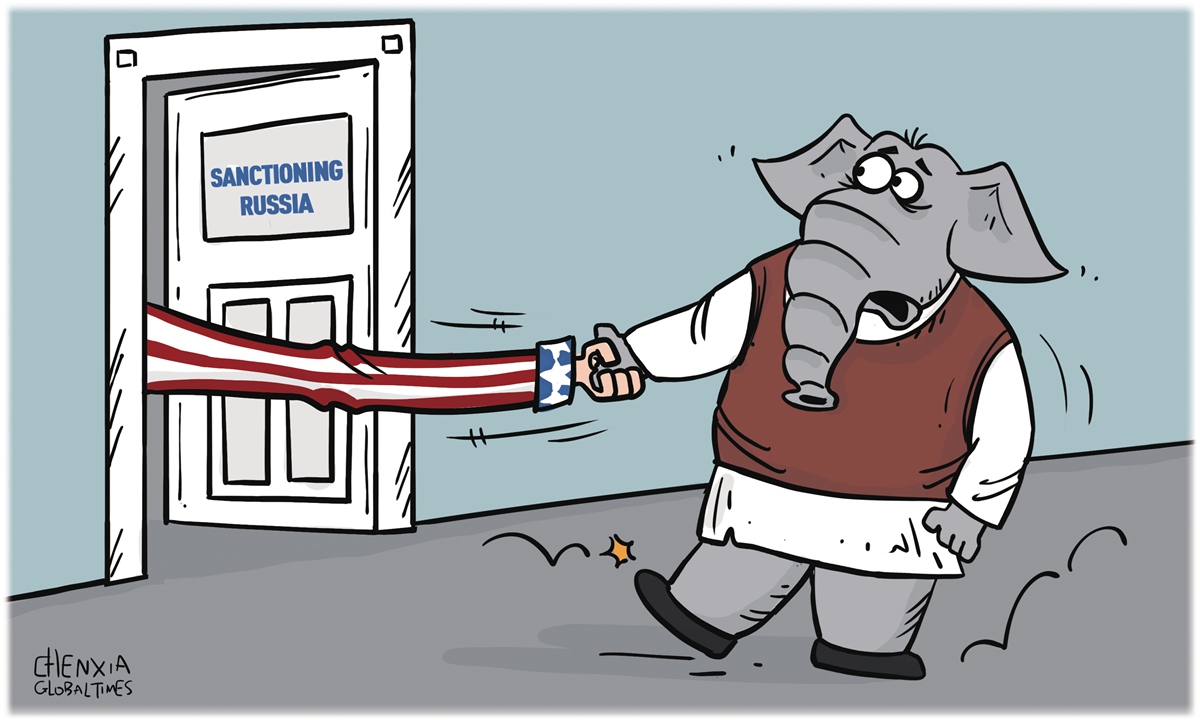
Illustration: Chen Xia/GT
Testifying before the Senate Armed Services Committee on "Military Posture in the Indo-Pacific Region" on Thursday, Admiral John Aquilino, Commander of US Indo-Pacific Command said the US will continue to support India with equipment and other things it needs along the Line of Actual Control - the border with China, and asserted that Washington and New Delhi share a "tremendous partnership." He also said that the military-to-military relationship between the two countries is probably at its highest point.
Aquilino's remarks indicate that the US may be eager to rope in India. Since the Ukraine crisis, Washington has been in an embarrassing situation. India, which the US is trying to court, has not followed its lead in sanctioning Russia. Some US and Western media outlets have repeatedly pushed India to condemn Russia.
Aquilino's focus is on driving a wedge between China and India, underlining the factor of the US in China-India relations. Its main goal is to encourage India to coordinate with the US' suppression of Russia. In Washington's view, the most persuasive method is to use China as the primary reason for India to develop closer relations with the US.
This is Washington's consistent trick. To maintain its regional and global hegemony, the US will resort to every conceivable means. But the effect of the wooing will be limited. India is a country with strong self-esteem which emphasizes strategic autonomy. New Delhi's ties with Moscow have been friendly for decades, relying on Moscow to provide arms and energy. In this context, India will not totally coordinate with the US in sanctioning Russia, a geopolitical dilemma it has attempted to avoid.
India would like to see a detente between Russia and the US, in which India could persuade the latter to focus on suppressing and containing China. India cannot simultaneously deal with the US and Russia as easily as it did in the past. Washington is forcing New Delhi to take a side. To become an ally or a partner would mean being the US' lackey and cannon fodder for attacking other countries.
India is fully aware of the US' intent and will not totally give in. Instead, New Delhi is exploiting the US to defend and achieve its own national interests. Within the tensions between Russia and Ukraine, the limitations and fragility of US-India ties will be further tested.
In the joint statement on US-UK Consultation on the Indo-Pacific issued on Friday by the White House, it read, "The US and the UK will work together… to enhance ties with India."
Apart from wooing India in regard to Ukraine crisis, another intent for the US to make such rhetoric is bluffing, sending a signal to its allies in the Indo-Pacific region. Even though the US and the UK are stuck in the Ukraine crisis, the two countries won't necessarily reduce their imput in the Indo-Pacific region.
The US failed to fulfill its mission on any front. In the Indo-Pacific region, it forces its allies and partners to agree on containing China. Yet countries in this region have very close ties with China in terms of politics, economy, even security, and are unwilling to take sides between China and the US. On the other hand, these countries need US funds, technology, markets and assistance. Yet the US is far from meeting the demands in this regard. That being said, the US tactics in the Indo-Pacific region have not made headway smoothly.
In the past, the US forcibly shifted to the Indo-Pacific, selectively ignoring its traditional geopolitical priorities like Europe and the Middle East. The Ukraine crisis is proof that the European front is a disaster. The US failed on both fronts.
The US is incapable of juggling both fronts at the same time. This is determined by the inherent drawback of US global strategy, which focus is to maintain global hegemony through military security and alliances. However, as the US' national strength declines, it invests less and less in allies and partners. Washington wants to manipulate and direct others behind the scenes. This approach has put increasing pressure on its allies and partners, and has gradually lost efficacy.
The author is head of the Department for Asia-Pacific Studies at China Institute of International Studies. opinion@globaltimes.com.cn




